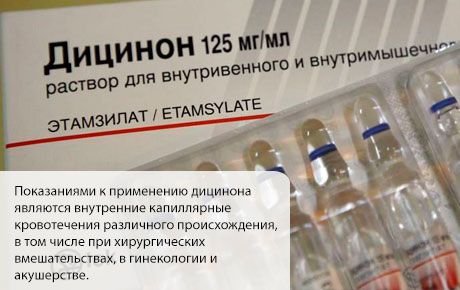Medical expert of the article
New publications
Preparations
Dicycin during pregnancy
Last reviewed: 23.04.2024

All iLive content is medically reviewed or fact checked to ensure as much factual accuracy as possible.
We have strict sourcing guidelines and only link to reputable media sites, academic research institutions and, whenever possible, medically peer reviewed studies. Note that the numbers in parentheses ([1], [2], etc.) are clickable links to these studies.
If you feel that any of our content is inaccurate, out-of-date, or otherwise questionable, please select it and press Ctrl + Enter.

In medicamentous treatment aimed at stopping bleeding, hemostatic drugs are used - tranexam or dicinone during pregnancy.
During pregnancy, women can face such a serious problem as bleeding. It happens for various reasons. In the first three months of gestation, with the appearance of bloody discharge, there are suspicions of a threat of miscarriage, ectopic pregnancy and antenatal fetal death. And the beginning of bleeding in the second half of pregnancy can be a signal of premature detachment of the placenta (with the possible formation of retrovascular glands), low location or presentation of the placenta, as well as a sign of aggravated diseases of the cervix or uterine body.
In any case, you should immediately contact a gynecologist who will find out the specific cause of the pathology and prescribe the treatment.
Apply dicycin in the early stages of pregnancy, as well as in the second and third trimesters, it is permissible solely for the doctor's prescription.
 [1]
[1]
Dicinone dosage during pregnancy
This drug is available in the form of tablets (250 mg each) and solution for injection (in ampoules of 2 ml / 250 mg).
The therapeutically justified daily dosage of dicinone during pregnancy is 10-20 mg of the drug per kilogram of weight. Typically, the doctor appoints to take dicycin tablets in pregnancy for one piece (250 mg) - 3-4 times during the day. The maximum effect with oral intake is achieved in three hours from the moment the tablet enters the stomach and lasts for five hours. The duration of taking the tablets is determined by the doctor, depending on the intensity of bloody discharge.

Parenteral administration of dicinone - in the form of intradermal or intravenous injections - causes a haemostatic effect much faster: after a quarter of an hour, and the maximum effect is noted on average after an hour and a half (with intramuscular injection - a little longer). Therefore, intravenous injections of dicinone during pregnancy are more suitable for sufficiently intense bloody discharge.
 [2],
[2],
Instruction of dicinone during pregnancy
The instructions of dicinone state that "application in pregnancy is possible only in cases where the potential benefit of therapy for the mother exceeds the possible risk to the fetus. If it is necessary to prescribe the drug during lactation, breastfeeding should be stopped. " What does this mean? In pharmacology, such a formulation appears in the instructions of those drugs, in the process of creation of which studies of their embryotoxic and teratogenic effects have not been conducted. That is, the safety of such drugs when penetrating the placental barrier is not established.
According to the instructions, the drug dicinone (trade name - etamzilate) promotes the production of platelets by the red bone marrow, and also speeds up their entry into the blood plasma. In addition, under the influence of this haemostatic (haemostatic) agent, the intensity of the formation of thromboplastin increases, which ensures blood clotting in damaged areas of the endothelium lining the inner surface of the capillaries. At the same time, the level of platelets in the blood remains within normal limits, therefore, at low platelet counts, dicynon does not make sense.
Dicinon during pregnancy, or rather, with bleeding during pregnancy, acts as a stimulant for the adhesion and aggregation activity of platelets (that is, their "adherence" to the damaged sections of the wall of blood vessels and the formation of a platelet plug). It is due to this (and not because of the increased coagulation of blood) and stops bleeding.
Indications for the use of dicinone are internal capillary bleeding of various origin, including surgical interventions, gynecology and obstetrics. Among the emergency cases of this drug - increased bleeding (hemorrhagic diathesis), pulmonary and intestinal bleeding.
And among its contraindications are noted: increased sensitivity to the constituent substances; acute form of such a hereditary disease as porphyria; violation of blood flow in the form of vein thrombosis, as well as clotting of the blood vessel with a thrombus (thromboembolism).
Tranexam or dicinon during pregnancy: which is better?
Like dicinone, during pregnancy, doctors can prescribe another hemostatic drug - traneksam (synonyms - urugol, tranex). This drug penetrates the placental barrier and is therefore used in pregnancy only as prescribed by the doctor in the case when the benefits for a pregnant woman exceed the potential risk to the fetus.
In addition, when assigning a traneskam, its contraindications should be taken into account: thrombosis or the threat of their development, deep vein thrombophlebitis, thromboembolic syndrome, impaired color vision, renal insufficiency.
Traneksam during pregnancy is used in the same cases as dicinone. But his pharmacodynamics is different. Tranexam acts as a hemostatic agent with an increased level of fibrinolysin (plasmin), a component of blood that prevents its coagulation. This drug slows the activation of the special proenzyme of plasminogen and converts it into fibrinolysin. That is, it has an effect on hemostasis, increasing intravascular coagulation.
Tranexam in tablets (250 mg each), doctors appoint one tablet 3-4 times a day. When bleeding in the first trimester of pregnancy - to stop its spontaneous interruption - the daily dose of the drug is not more than 1000 mg (4 tablets), at later times - 1000-2000 mg per day. Injection method of application suggests intravenous administration of a tranescam in the form of a solution (in 5 ml ampoules). Dosage is determined depending on the volume of blood loss and body weight: 10-15 mg per kilogram.
If you take tranexam or dicinone during pregnancy, then you may have undesirable side effects. Thus, dicycin administration can cause headache, dizziness, redness of the face, nausea, heartburn, pain in the stomach, lowering blood pressure, numbness (paresthesia) of the legs.
And the possible side effects of tranexam are manifested in the form of dizziness, weakness, drowsiness, skin rash and itching, vomiting, nausea, diarrhea, heartburn, decreased appetite, impaired color perception, and tachycardia and chest pain.
The price of dicinone in pregnancy
For today - depending on the manufacturer and the region of Ukraine - the price of dicinone during pregnancy varies: dicinone in tablets (250 mg, packing 100 pieces) - within 95-135 UAH; dicinone in the form of solution for injection (250 mg, 2 ml ampoule, 50 packs) - from 90 to 145 UAH. For packing. The average cost of one ampoule (if in a particular pharmacy they sell drugs in ampoules per piece) about 2 UAH.
The prices for tranexes in tablets (packing 30 pieces) of manufacture of the Russian Federation - in a range 178-225 grn .; the cost of packing traneksa (30 capsules of 250 mg) of the company Malesci - 132-168 UAH. Ugurol (traneksam) firm Rottafarm in ampoules of 5 ml (in the package 5 ampoules) is approximately 220-240 UAH. And the price of tranexam for parenteral use is 768-790 UAH. For 10 ampoules of 5 ml.
Reviews of dicinone during pregnancy
Hemostatic drugs, in particular tranexam or dicinone during pregnancy, in cases of necessity to stop bleeding are used despite their side effects. The use of these medicines, as exemplified by clinical practice and clinic reviews of dicinone during pregnancy, is entirely justified, since it helps to stop the loss of blood and in many situations to avoid miscarriage at the first stages of bearing a child. At the same time, the effect on the indices of the hemostatic system, that is, the system providing a balance of coagulation and blood coagulation while maintaining its liquid state, is minimal.
And responses about dicinone during pregnancy of those patients who themselves had to take this medicine are different. Someone he helped to save the pregnancy, but someone, despite the efforts of doctors, this could not do ...
It should be remembered that dicinone in pregnancy - like any other pharmaceutical drug under these circumstances - must be prescribed by a doctor! A doctor should be 100% sure that the potential benefit of a medicine prescribed to a future mother is much higher than the possible risk to the life and health of her unborn child.
Attention!
To simplify the perception of information, this instruction for use of the drug "Dicycin during pregnancy" translated and presented in a special form on the basis of the official instructions for medical use of the drug. Before use read the annotation that came directly to medicines.
Description provided for informational purposes and is not a guide to self-healing. The need for this drug, the purpose of the treatment regimen, methods and dose of the drug is determined solely by the attending physician. Self-medication is dangerous for your health.

